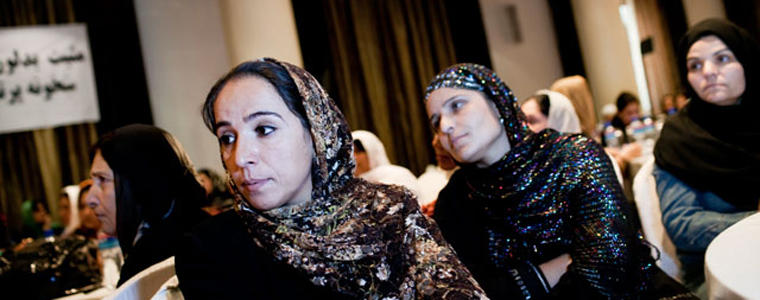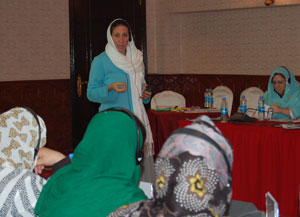USIP has established a program, Capacity-Building and Dialogues for Afghan Women, in an effort to reach beyond the capital Kabul and help prepare women elsewhere to play a role in peace and post-conflict processes.

In an effort to reach beyond the capital Kabul and help prepare women elsewhere to play a role in peace and post-conflict processes, the U.S. Institute of Peace (USIP) last month began training women leaders from two troubled Afghan provinces. Those trained will later facilitate dialogues among other women from districts in their provinces.
The program, called Capacity-Building and Dialogues for Afghan Women, is headed by USIP's Mary Hope Schwoebel, a senior program officer in its Academy for International Conflict Management and Peacebuilding and a specialist in Africa, Latin America and South Asia through her past work in nongovernmental organizations and universities. Schwoebel says the new USIP effort, which follows an earlier dialogue program across the Afghan and Pakistani border, recognizes that gains for Afghan women and girls in post-Taliban Afghanistan, though significant, are limited and need to be protected and consolidated as the Afghan society and government move beyond the period during which they have been able to count on a significant international presence.
"The million-dollar question is how to sustain those gains when the U.S. and international community leave," Schwoebel said. "This project really focuses on the women in the provinces. We need to make sure that the gains extend beyond Kabul. There is also a need to strengthen the linkages between women leaders in Kabul and women leaders in the provinces."
 Eighteen women from two conservative provinces, Wardak and Ghazni, received a week of USIP training in mid-June in Kabul in facilitating dialogues, with topics including building understanding and respecting diverse perspectives, building consensus and encouraging collaboration across groups. The women include district- and provincial-level professional women, including teachers, public health workers and local female government officials. They received training from Schwoebel and USIP Senior Program Officer Alison Milofsky with the intention of preparing them to serve as dialogue facilitators within their provinces. The funding comes from the U.S. Agency for International Development.
Eighteen women from two conservative provinces, Wardak and Ghazni, received a week of USIP training in mid-June in Kabul in facilitating dialogues, with topics including building understanding and respecting diverse perspectives, building consensus and encouraging collaboration across groups. The women include district- and provincial-level professional women, including teachers, public health workers and local female government officials. They received training from Schwoebel and USIP Senior Program Officer Alison Milofsky with the intention of preparing them to serve as dialogue facilitators within their provinces. The funding comes from the U.S. Agency for International Development.
The women range across ethnic and sectarian groups and come from different political persuasions and age groups. One leader of a civil society organization in Ghazni said, "You need to do these dialogues everywhere in Afghanistan. This is what we women, we Afghans, need. We need to understand each other. I never get to talk to some women because I only know Pashto. But in the workshop, we could talk to each other because you had Pashto and Dari translators."
Added a respected women's leader from Wardak, "In the workshop we talked to each other and we listened to each other. It made me feel like I might be able to change my life. I might even be able to improve life for other people from my community."
The sessions, said Schwoebel, focused on "identifying common ground as women" despite their many differences. Schwoebel says that the June trainings suggested that opportunities for finding common ground exist with such issues as preventing violence against women and children and women's rights to work and study outside the home. One issue that was raised was that of household violence by women against women—for example, abuse of daughter-in-laws by their mother-in-laws. The USIP sessions also aimed at forging links between the rural Afghan women and those from Kabul who are involved in national-level peace activities.
The women trained by USIP are expected to run their own set of dialogues for other women from districts in their provinces in September.
Building the capacity of provincial and district Afghan women not only promotes their ability to protect women's rights in a country in transition, notes Schwoebel. It is intended to strengthen overall efforts to bolster peace and security—to the benefit of Afghans and the international community alike. "Women are much more likely to reach across identity-based social divisions to understand their common interests in peace, security and development," she said. "When women are divided, they can't advocate for their rights, and their potential to support wider peace efforts is diminished."
Explore Further